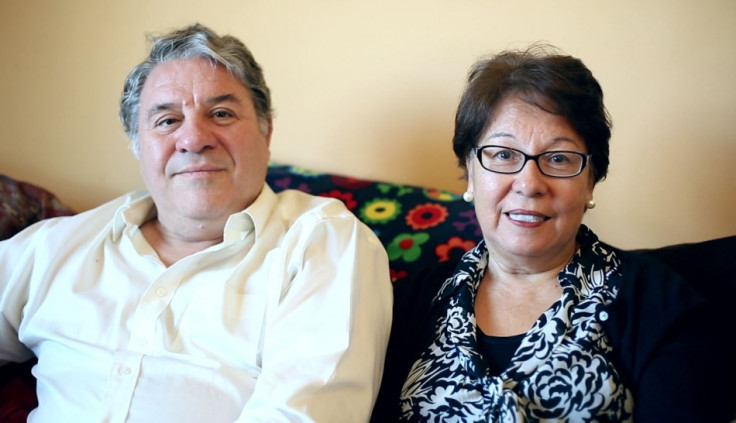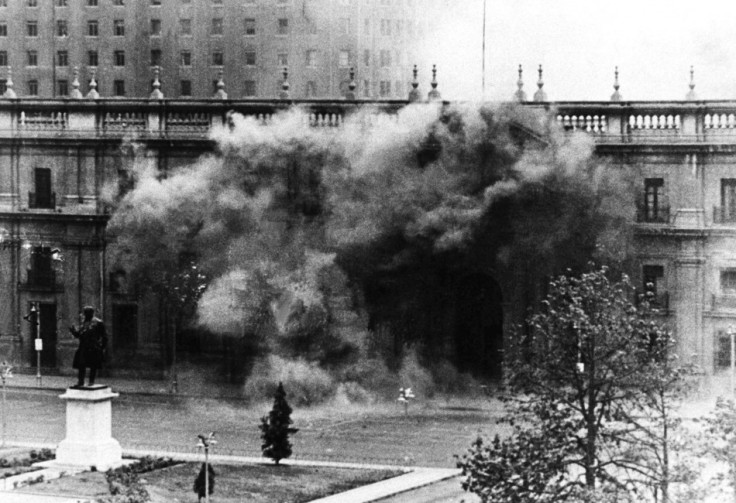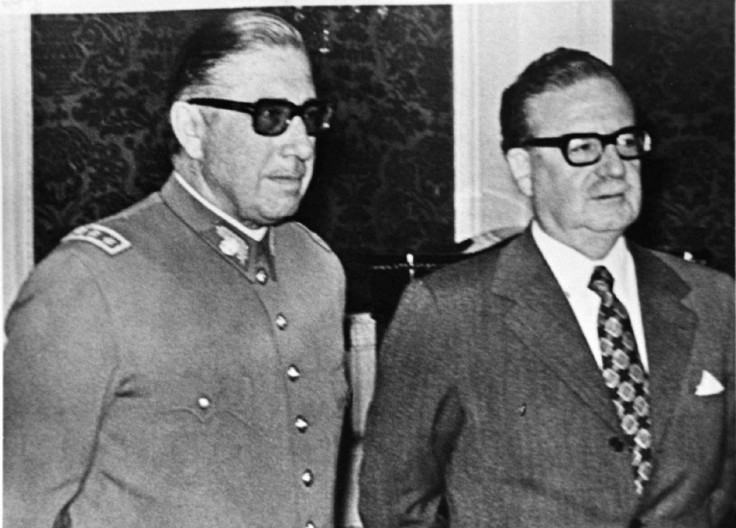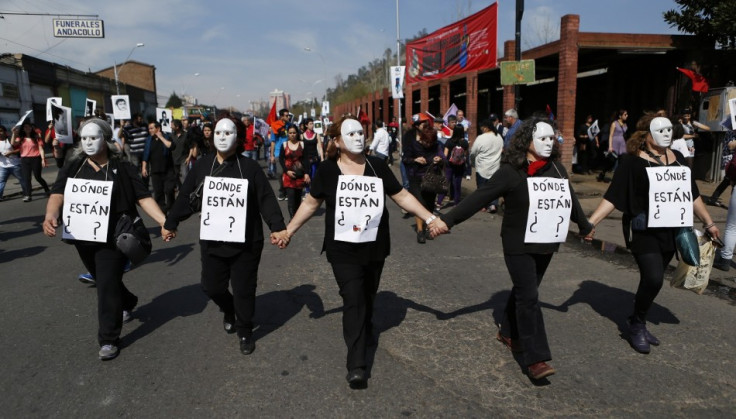11 September 1973: Chile's Torture Survivors Roberto and Cristina Navarrete Denounce Pinochet Legacy [VIDEO]
Roberto and Cristina Navarrete tell IBTimes UK how Chilean dictator's brutal legacy survives in economic hardship

On the day that the Chilean air force bombed La Moneda, Chile's presidential palace, 17-year-old Roberto Navarrete was in medical school and was told by the students' union to go to an area outside the capital of Santiago with his fellow students and await further instructions.
A military patrol passed by the students and the soldiers in the trucks suddenly opened fire on them. Roberto was shot in the arm and taken to the national stadium in Santiago, along with other 10,000 people. He was held prisoner there for a month.
It was a spring morning, Tuesday, 11 September, 1973, that changed the course of history in Chile. Salvador Allende, the country's first democratically elected socialist president, was toppled by the army led by Gen Augusto Pinochet who brought in a 20-year reign of terror.
For Roberto and his wife, Cristina, it marked the start of a long and brutal odyssey of beatings, torture and rape that many classified as the "Disappeared" were all too familiar with.
The couple were politically active as fervent supporters of Allende's social democratic reforms, which saw the nationalisation of the copper industry and public services and the restructuring of land ownership.
"The government was introducing reforms and measures - not only for the benefit of the working class but directly attacking the interests of very wealthy people and powerful companies," Cristina says, her eyes sparkling with memories of the buzzing political atmosphere pre-coup.
"I wasn't a supporter of Allende, I had a Christian background. I was converted to his cause because of the things he was implementing. There was no doubt that he was transforming the life of the vast majority of the people."
It was not a belief shared by the Kissinger-era United States. Edward Korry, the US ambassador in Santiago at the time, told Secretary of State Kissinger: "Once Allende comes to power we shall do all within our power to condemn Chile and the Chileans to the utmost deprivation and poverty."
And that is exactly what happened. Parliament was emasculated, factory production and distribution were disrupted and the end result was the CIA-sponsored coup and the assassination of political opponents. "The violence that was unleashed was a one-sided violence," says Roberto.
Wealth made of blood

His wife was arrested in December 1974, more than a year after the coup. Her name was passed to the secret police by a torture victim. She was called in by the director of the hospital where she had an internship as part of her degree in clinical science and was grabbed by two men who were waiting behind the door.
She was taken to the infamous torture centre of Villa Grimaldi before transfer to Tres Alamos and Cuatro Alamos concentration camps, where she was imprisoned for nearly a year. She effectively disappeared. She was not even able to get a note to her husband.
Roberto was forced to go into hiding in the Venezuelan embassy and was then granted asylum in Britain. From there, he campaigned for the release of Cristina. She was freed six months later and joined him in London. For 40 years, they have called London "home".
"I was one of the people who disappeared in the secret torture places. I was subjected to torture, electricity, on many parts of my body. They used special methods on women - a dog had been trained to sexually abuse female detainees," she says.
Despite her obvious pain at the memories, Cristina does not allow herself to indulge in her own personal suffering and moves away from her story to embrace the economic suffering of most Chileans 40 years on from the coup.
"The coup led to massive disappearances and extermination but also allowed the introduction of a number of rightwing reforms for the wealth of big companies which were making millions," she says.
"You can say it's money made out of the blood and torture and sufferings not only of those who died but also of those who live in Chile today. They have to pay for their education and have no security at work. [They work at] whatever they can get."
The Chilean oligarchs

The legacy of the Pinochet regime is a matter of discussion for economic experts these days. Not only is the former dictator still revered in many parts of the country - despite the killing of more than 3,000 political opponents and torture of many more - but many rightwing historians defends his programme of privatisations in the light of the country's prosperity.
The military government, they claim, opened up the economy to the free market, inviting foreign mining companies back into the country and selling off state assets. Education and pensions were privatised. That laid the foundations for the country's later economic prosperity, according to many experts.
Roberto, however, sees a more fitting parallel with what happened in post-Soviet Russia in the 1990s.
"There's a documented connection between the academic economists at the Chicago School [of Economics] of Milton Friedman, funded by the Rockefeller Foundation, and the application of a whole set of reforms which produced the most extremist programme of neo-liberalism in the world," he claims.
"Chilean economists were trained by Friedman and designed a programme of reforms that Pinochet put in place from 1975."
More and more people are making a direct connection between the military takeover and the neo-liberal reforms that are still in place in Chile, he adds. The neocon experiment reached its height during the Pinochet regime, when no opposition was in place.
"The narrative of the world is: why are you complaining? Chile is one of the wealthiest countries in South America. Foreigners go to Santiago and admire those beautiful buildings. But they forget that economic growth has benefited only the country's elite, with the vast majority of people struggling to make it at the end of the month," he says.
Chilean oligarchs, according to Roberto, were able to buy state assets such as electricity and telecoms with state loans, just as the Russian oligarchs did after the fall of communism. The system has not been challenged since democracy returned in the 1990s.
"It is true that Chile has grown, especially after the return of democracy, thanks to foreign investments but that accumulation is extremely unequal," he says. "0.1% of the population earns £150,000 per month while 50% of population have salaries of less than $500 per month. Everything is privatised from health to education, with prices of food and oil integrated with the world economy."
A new openness

Tens of thousands of Chileans rallied in the capital this year to commemorate the overthrow of Allende. An unprecedented chain of events - conferences, book launches, plays, documentaries and live performances - marked the 40th anniversary of his fall and have started to tear the veil of silence over what happened.
Mainstream media and television channels have aired previously unseen film footage from the years of Allende, and the coup and the repression that followed. Many politicians from the period have apologised for their actions. A conspiracy of silence is cracking.
With his son Pablo, Roberto has set up an independent production company making documentaries on Latin America. Their latest is on the student movement in Chile, which has developed and surged in the last two years.
"The new openness has been a real surprise for us," says Roberto. "Imagine that for 40 years Chileans who live in Chile and have no internet had no idea of what happened and were not educated because the coup was not included in the curriculum in history.
"It is the first time you see images of the coup and what happened next [on the] television networks. It's an eye-opener for large part of the population," he says.
Cristina said that even after 1998, when they were allowed to return to Chile, she felt uneasy about going back to her homeland.
"No-one was willing to talk about the Pinochet regime. The dominant sentiment was 'forgive and forget' - unlike here in the UK with the Chilean diaspora ," she says. "But from last year people within Chile have started to talk more openly about the coup and its consequences.
She sighs with relief and says: "It was a catharsis."
Amnesty International is hosting a photography exhibition at its UK headquarters in Shoreditch to mark the 40<sup>th anniversary of General Augusto Pinochet's bloody military coup in Chile.
The exhibition features works of photographer Julio Etchart who spent the 1980s documenting life under Pinochet and resistance to his regime. His photographs were published in many leading UK and international newspapers, including the Guardian, Sunday Times and New York Times, and were previously exhibited by Amnesty.
The exhibition runs until 20 September. Amnesty campaigned actively against human rights abuses under Pinochet.
© Copyright IBTimes 2025. All rights reserved.






















